 Home > News Stories and Obituaries
Home > News Stories and Obituaries Newsmaker Interview: New King Features Comics Editor Brendan Burford
posted May 1, 2007
Newsmaker Interview: New King Features Comics Editor Brendan Burford
posted May 1, 2007

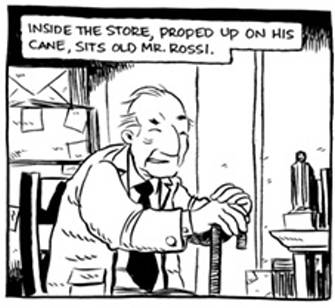
*****
On April 23, a little more than a month after
the sudden passing of Editor in Chief Jay Kennedy, King Features Syndicate
named Associate Editor Brendan Burford to the position of Comics Editor, where he has assumed the comics-related duties of his longtime mentor. What makes this news worthing noting isn't just that the giant syndicate named a well-liked member of the King Features family to the position, but that Burford cuts a slightly different profile than any major comic strip editor that's come before him: he's a cartoonist, a graduate of
School of Visual Arts, he was briefly an employee of a major comic book company, he's a small press comics anthology editor and publisher (
Syncopated), and he's younger than 30 years old. Mr. Burford was nice enough to give me a few minutes of his time late last week. We talked about the significance of his place in comics, some of the issues that King Features may face in the years ahead, and what he learned from his predecessor and friend.
*****
TOM SPURGEON: When your promotion was announced, I think it was [King Features President] Rocky Shepard who in one of the articles indicated that you were the heir apparent. Were you aware of this? Was this position something you felt you might want someday?
BRENDAN BURFORD: Regardless of how I felt about it, initially speaking at least, it was made very clear to me by Jay [Kennedy] and by the president of the company that I would, if I stuck around, take over for Jay one day. Before Jay passed away, that could have meant a year from now, or it could have meant five years from now. There was no timetable. Jay and I always spoke candidly and frankly. "You know, if you want to, one day you can run this place. You just have to stick around until I'm gone." He sometimes talked about moving on to try other things, or retirement, he was never one of these guys who knew he was going to be at King Features until he was 65. He lived for the day.
SPURGEON: He had gone through such a massive life event himself several months before his passing it wouldn't be surprising to me if he had turned reflective.
BURFORD: It's possible. I had noticed that in various aspects of his life. But in terms of his job, it's not like he re-evaluated his job. He always had this attitude of living for the day. He was always cognizant that a year from now he could have moved onto another thing.

He was a very considerate person towards King Features in thinking, "I'm not going to leave them high and dry if I am gone one day." So there was kind of this grooming process with me. He wasn't just considerate to King Features. He was considerate to me. This is really not a difficult transition for me to make aside from the emotional impact that it's had on me because I've lost a very good friend. But as far as knowing how to do this job, I can do the job.
SPURGEON: Is there any specific duty you have now for which you haven't been trained? Have you done any hands-on editing with the strips?
BURFORD: Yeah. I've launched a couple of strips with King where I was the primary editor of the strip. Jay and I basically split the chore. When it came to launching new stuff, it was like he would take one out, and then I would take one out. When it came to the existing list of features we represent, anybody who needed hand-holding he would take some, I would take some. A lot of them were just on autopilot. We have
our copy editors down in Orlando, who if any flags went up they probably... the last two or three years they would just usually call me because they would just get an answer from me quicker. [laughter]
A lot of that stuff hasn't changed. There's a learning curve on a couple of things. I was never really dealing with contract negotiations, and I'm probably going to have to step in and do more of that. In the end, we have smart lawyers here, we have people who know how to draft contracts. King Features writes a really fair contract, too. You know this.
SPURGEON: Yeah, sure.
BURFORD: We're not interested in screwing anyone. We want to cultivate a long-term, healthy relationship. It's not like it's a monumental task that's now fallen on me.
SPURGEON: In terms of both in-house and the cartoonists, has there been support for you during this transitional period?
BURFORD: Absolutely. It's really flattering, actually. We have a great team internally here. Some really sweet people we work with. And some really smart people we work with, too. They know what they're doing. I've had a relationship with these people for over seven years now. It's grown from the beginnings on the lower part of the totem pole where I set up, and I've climbed up through the years. Everyone has been supportive and sweet about it. The cartoonists as well. I've gotten dozens of e-mails, phone calls, letters, all of that, expressing either support or joy or relief or whatever it is. "If Jay can't be there, we're glad you are." It's been encouraging and flattering. I don't feel like I have to swim upstream too much when it comes to convincing people. I start in a good spot, and I just have to continue.
 SPURGEON: One thing I was confused by is that Jay's title was Editor in Chief while you're Comics Editor. Did Jay have the columnists, too?
SPURGEON: One thing I was confused by is that Jay's title was Editor in Chief while you're Comics Editor. Did Jay have the columnists, too?
BURFORD: Not really. We have a gentleman here named Glenn Mott. He's the managing editor. He handles columns. He is also our director of book publishing, because he comes from the book publishing world. Glenn has been working here for about six years now. Jay let him do what he needed to do with columns, and that's how it's going to continue. Jay was his boss, and Jay was my boss. Jay had Glenn on the columns side and me on the comics side. Now essentially Glenn and I neither of us answers to either one. He runs the columns program and I'm running the comics program.
SPURGEON: I think people are familiar with how you might conduct a relationship with a new cartoonist, or a developing one, but as Editor how do you interact with the well-established pros?
BURFORD: Sometimes months will pass where I don't talk to some cartoonists. There's constant contact between them and our copy editors. I might need to call them if there's a problem with a strip. "Hey, we can't say that." Or "We have to pull this strip or it's going to get us in trouble." Sometimes it's damage control. Other times it's working on promotional programs for one of those established strip, being the creative guiding force, and even kind of a conduit for the creator to our marketing and PR department, or our sales department or whatever. Jay and I were always the guys who could speak their language and translate it to everybody else.
Our basic relationship is that whenever something does come up and there is something that needs editorial guidance or translation or whatever, we're there for that. I think I generally have a good rapport with the established cartoonists. They think I know a lot about comics. They respect my opinion about things. It's all very comfortable.
SPURGEON: One more technical question about the transition. How much of Jay's work is still in the backlog? How much are we still going to see that's Jay's?

BURFORD: There's a strip coming out in May called
My Cage by Ed Power and
Melissa DeJesus. It's a work environment/home environment strip about these anthropomorphic animals. It's got a manga-influenced art style to it, so we're trying to appeal to the younger readers. It's very much a young person in their 20s working a professional job and the life they lead. It's a slice of life strip. It certainly isn't manga, but it has that influence in its look. Jay was really high on that strip and was really super-instrumental in getting that developed and launched. I didn't have a whole lot to do with that strip myself. But now I've taken over and been a guiding force for the creative team.
Basically, that's it. There's a strip I'm taking out to the May sales meeting at the end of May called
Arctic Circle, by this cartoonist named
Alex Hallatt, who lives in New Zealand. Jay said "We'd like to give you a development deal," and then handed it over to me. It became more my strip than his strip towards the end. He had a million things going on, and he said, "Hey, do you want this?" And I said, "Sure." I also have a couple of strips that date back to before Jay's passing in the development queue. I'm up to the beginning of 2008.
SPURGEON: How would you characterize the DailyINK effort at this moment in time? I'd be particularly interested in how your perception of the initiative might have changed now that you have a couple of years under your belt.
BURFORD: I think DailyINK is a logical digital application of the print syndication cartoons. You have the stuff, and of course you want to put it out there every which way you can. DailyINK is a way to put it out there. Philosophically we don't want to put everything out there for free. We want to hold back as much as we can. We think there's value to this stuff. How do you expect the cartoonists to get paid and etc., etc. Granted, most people know the majority of the money comes from print revenues, but we have to start precedents. It's a logical extension of print syndication. It definitely needs to grow, but I think people still are kind of trying to feel it out and see what's going to happen.
We certainly recognize that it's something that needs to be attacked, something that needs to be done, but our attitude and our philosophy all the way back to us wanting to hold back on giving away free comics is to just slow down, wait for things to develop, make the move when it makes sense and it's right. I think there's so much figuring out to still be done. How is this a business? If it is a business, and we try to apply it, are we going to kick ourselves for having gone out too soon with that business. Are we going to be disappointed in that business for not having greater returns and if that is the case, how long do you stick with it before you change course? So it's an ongoing research project to figure out where we want to make our mark and how we want to make our mark. All of that said, I think you can expect some things from King Features in the next year or two. Big things, where digital space is concerned.
SPURGEON: Would you describe that effort as augmenting
what DailyINK does or supplanting
it?
BURFORD: I think it's more of an augmentation than anything else. You can't supplant it. If you're going to go direct to your consumer, you want to do it in as friendly a way as possible. Like I said, it's such a logical, easy extension of what we're already doing, we have the strips. We have coding to make it so that people can pick whatever strips they want, pay for them, search through the archives, enlarge them, all those bells and whistles that come up. You have to do that in my mind.
SPURGEON: I'd like to ask you about the state of the market. My eyes got a little wide a few months back when Foxtrot
dumped its dailies, and there was no clear successor, you had strips at all levels picking up papers. It seemed to me that indicated a market of really diverse access points, not a successive hit market anymore. I know this is a lot to ask, but do you have a basic grasp on where the market is right now and how King Features approaches this moment in strip history?
BURFORD: I think the
Foxtrot discussion is a good segue into this larger discussion. What it taught me and I imagine the other syndicates as well was that this whole, "This is the logical replacement for this strip because it meets that old strip's demographic need, etc., etc."? That's all bullshit.

Editors, if they want to buy a new comic strip, it probably means they had to drop something to fit it in. Either a retiring strip, or a strip that polled weakly, or a strip they got angry letters about. There are a million different scenarios that occur. When that happens, the editors at these newspapers have their wish lists. Often very high on their wish lists is something like
Zits. When
Foxtrot falls out, what happens? Well, there's no real logical demographic replacement for that necessarily anyway, it had a uniqueness to it. If any syndicate went out trying to find that logical demographic replacement for
Foxtrot, I think they learned quickly that newspapers put in whatever was first on their wish list. If
Zits was first, that's what they put in. If our new strip
Edison Lee was first, that's what they put in.
Tina's Groove picked up a lot of slots;
Tina's Groove and
Foxtrot are two very different strips in terms of demographic, but
Rina Piccolo benefited from that.
SPURGEON: How much is demographic appeal a driving factor in strip development. It seems that there are two competing impulses in new strips. One is this unique artistic contribution, and the other is a strip that appeals to a certain demographic, "This is the strip for this kind of person" kind of marketing. How much is each a part of King Features' philosophy? How do you balance those impulses? I know it's not a clear delineation.
BURFORD: It's a little bit of both, right? First of all, very perceptive question. This is something that I'm conflicted about and don't know the answer to. The business part of me says if there was a formula we'd be out with it every time. But there isn't a formula. I think if you look at the last ten launches from King Features, back to the early 2000s, you'll find an even distribution of strips that are built solely to meet some kind of demographic need, or it's built in with all kinds of hooks that those hooks are going to be what actually sells it. And then there's the strips where we're selling it just on the merits of the cartoonist, the unique voice, who this person is. And then there's going to be with that, the overarching that they're all talented enough to become syndicated, and some might have hooks.

Perfect example: we came up with a strip called
Retail. It's in the title! [Spurgeon laughs] It's a strip about retail workers; we want to appeal to this part of the demographic. It makes perfect sense. It's someone who is not represented. Something like 33 percent of the US workforce has worked in retail at some point in their life. It's obvious. But the guy's talented. He [Norm Feuti] writes good gags and has created some characters I think are likable. On the other hand, I have this strip I'm taking out for my May sales meeting. It's a very simple premise. It's not necessarily hook-laden. It's a unique cartoonist with a unique voice. We're going to sell it based on the fact that this is a humorous strip.
If you look in the past, how do you categorize
Calvin and Hobbes? How do you really characterize
Zits? How do you characterize
Mutts? Oh sure, it's "Oh, that's the animal strip." Or "That's the teen versus the parents strip." Those are so general you can't call them hooks. On that general level you could categorize everything. What we're really looking at with
Calvin and Hobbes and
Zits and
Mutts is that it's the geniuses behind them that make them tick.
That's a long way to get to "I don't know." [laughter] My default setting is go after the voice. I like to think of myself as an artist's advocate-type editor. I'm super-liberal when it comes to that debate. I always defer to someone I think is a talented person, and I try to let their talent and their impulses shine through more than some kind of contrivance, some kind of concoction. That's what I lean towards.
 SPURGEON: What happens to
SPURGEON: What happens to Syncopated
now?
BURFORD: I don't plan on stopping. I think that comics as first-person journalism, or comics as journalism, is a great, viable way of introducing comics to a non-comics reading public. That's what I kind of want to go for with
Syncopated, an easy entry point for literate people. I plan on it growing; I want it to become better. I want it to become less of a guy doing it out of his home studio [laughter] and more of a professional type periodical.
SPURGEON: When I thought of Syncopated
recently, it occurred to me you might have the first small-press anthology with 4000 submissions, just from people trying to get your attention due to your day job.
BURFORD: It's so funny. My personal e-mail address is out there, you just have to look for it. My King Features e-mail isn't necessarily. I'm getting e-mails from people about King on my personal e-mail address now. It's like, "What do I do? Do I change it? Do I shut it down?" I think I can kind of keep church and state separate.
SPURGEON: Of the one or two things I thought might be specific challenges for a syndicate right now, one is the changes in marketing and publicity due to the rise of new media. Is there any thought to changing how you get the word out and how you maintain a level of buzz about your properties as the media landscape changes?
BURFORD: So much of what King Features offers are just pop culture icons. They won't disappear overnight. They'll still be around. As far as new stuff, I'm excited about new media possibilities for market awareness. And if digital media itself ends up being something we get very, very involved in, I'm going to be able to call on cartoonists I've never been able to call on before. That excites me to no end. Don't get me wrong. I like the classic business of comic strip syndication to newspapers. But we need to be nimble and think about the future. We're going to continue to do that for a very long time, even inside the strict parameters of what's acceptable. But to me the sky's the limit. I don't see any reason why a company that's lasted over a hundred years can't last another hundred just because there are changes in platform.
SPURGEON: How much of your job is maximizing these properties with which you're in partnership? Is it more a matter of managing the strip aspects and what happens, happens, or are you a driving force behind seeing these properties succeed in all areas?
BURFORD: Essentially the buck stops here. Anything that happens creatively with one of our comic strips, it's not going to happen without crossing my desk.
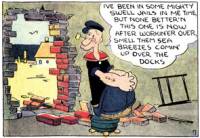 SPURGEON: Do you have input on something as specific as the new Popeye book from Fantagraphics?
SPURGEON: Do you have input on something as specific as the new Popeye book from Fantagraphics?
BURFORD: With that particular book, we deferred to Fantagraphics. As far as the deal is concerned, Glenn Mott comes from the book publishing world and he's involved with structuring deals. I get involved when there are creative questions. There weren't a lot of creative questions on Popeye. Boy, that was a beautiful book.
We're very involved with a new
Blondie book coming out, the creative back and forth with the publisher. It's a case by case thing. There's no overarching policy. We've published some beautiful books for
Patrick McDonnell through
Andrews McMeel and
Abrams... and you'd be an idiot not to defer to Pat McDonnell on projects like that. He has one of the best eyes in the business. We're here to facilitate that.
SPURGEON: Do you have people in Hollywood? Licensing agents and all that?
BURFORD: We're constantly involved with finding opportunities for our properties. But it's a limited world of possibilities and we have a really big list. You want to make everybody happy. But oftentimes you go with the stuff that's proven to work, or something that's on the table at the moment. When someone comes to us that prompts activity with that strip. We try to pay equal attention to everything, obviously. If there's an event or something's occurring out there that makes us think it's a good time to pay attention to
Bizarro, for example, that thinking is constantly turned over and renewed. I think we do a pretty good job of juggling a list of about 70 comic strips in an incredibly finite world.
SPURGEON: Let me ask you about that, then. Is there any thought that with declining newspaper circulation and the shrinking number of papers, period, that you're carrying too many features, that there's bloat in your back catalog that doesn't serve the whole?
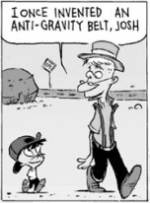 BURFORD:
BURFORD: That's a good question. I don't know how I feel about that question, and I don't really have a stance on it necessarily. But I can tell you the reality of it. Philosophically is another question, but the reality of it is this. King Features takes out about two or three new comic strips a year. Sometimes they work, sometimes they don't. You know this. And it's not necessarily based on the merits of the comic strip. In my perfect world,
Franklin Fibbs would have been right there with the rest of them making everybody money. But it didn't take.
I've deviated from your question a bit, but the point is this. We launch two to three new comic strips a year. When we launch those new comic strips, it gives our guys a new opportunity to call on an editor at a newspaper and talk to them about the list, and talk to them about what we've got that's new, or something on the back list they might be interested in. If they failed all that often, we wouldn't take that many out a year. There's room enough for them to survive. In the end it's a business. We believe in the comics business. We believe there's room for more than a dozen cartoonists. We want to put as much good stuff out there as possible. That's kind of the purist take on it. It makes it exciting for me. I get to work with these great new people all the time. It makes me want to report to work every day.
SPURGEON: I never considered the idea that having new strip might be a positive beyond selling that strip that day.
BURFORD: It's good to get that feedback, to find out if we were just thinking in a vacuum when we cooked something up. We don't always know. I think we generally come out with good stuff. Some of the really good stuff doesn't always survive, but if there was a formula, we'd take advantage of it.
SPURGEON: I've noticed more comic strip cartoonists at conventions like San Diego and MoCCA, and more book signings and the like. Is this something you'd like to see continue, comic strip cartoonists taking their seat at the table for all comics?
BURFORD: I worked at DC Comics for a year as an editorial assistant. I was talking to one of the editors there. Some pages from
Walt Simonson came through and I said, "I always thought he was such a great cartoonist." He stopped me and said, "You know you're one of the few poeple that calls comic book artists cartoonists." I'm like "Don't give me that bullshit!" I don't care if you're
Frank Frazetta or
Charles Schulz or anyone in between, you're a cartoonist. A few people are illustrators, but most are cartoonists.
The reason I bring that up is to let you know that to me comics is comics. Whether you're a comic strip, a superhero comic book, or
Robert Crumb, or some autobiographical underground thing, or you're an editorial cartoonist or you're doing
Dr. Seuss-type stuff. It's cartoons. Comics is comics in my mind. So the whole convention thing makes sense that syndicate cartoonists are mentioned and recognized in the same category in the same vein as whoever the flavor of the month might be in the alternative comix world or the superhero world or even the manga world. Appearing at a convention solidifies in my mind this definition of comics being all married and all connected by this common thread.
Even more fundamentally, you're probably seeing a little more awareness towards convention because comics are big again. The graphic novel boom. The manga boom. And it's reported on. Guys like
you and
Dirk [Deppey] and
Heidi [MacDonald]. It's reported on. It's an awareness factor I think.
SPURGEON: Are you going to have travel more in this position?
BURFORD: Probably a little bit more. I did some traveling before. Three times a year we have a sales meeting. It's not always here in New York. So I'll do some traveling for that. I attend the
Reubens every year. I travel for that. The
Ohio State cartooning conference they have every third year. There's probably going to be more traveling as an ambassador, more the stuff Jay used to do.
SPURGEON: Have you given that aspect any thought? You're the face of King Features now to a lot of people.
BURFORD: I wouldn't think of myself that way. The face of King Features is the comics, and I'm the guy who's facilitating it.
SPURGEON: Sure, but when you walk in a room now, King Features has shown up.
BURFORD: That was happening before, to be honest with you. I'd go to an NCS Christmas party, and a million guys -- of course a million guys would be exaggerating -- a couple of guys would approach and say, "Brendan, I have a great idea for a strip. Can I send it to you?" I was probably deflecting a lot of it for Jay. Maybe I'll notice an
up tick in that attention now.
 SPURGEON: Have you ever had someone pitch you a strip in a weird place?
SPURGEON: Have you ever had someone pitch you a strip in a weird place?
BURFORD: A weird place?
SPURGEON: Like a taxicab or at a cocktail party. Because as much news as there is about the bleak prospects, there's still massive interest by people in getting a strip into the newspapers.
BURFORD: Everybody and their mothers thinks they can do it, because it's so deceptively simple looking. It really is one of those last Cinderella professions, where it seems like something an average guy can accomplish. As opposed to something like professional baseball. I should dispel that, though, because I think a good cartoonist works just as hard and has just as much innate talent as a major league baseball player. It's probably harder to get a job for a cartoonist than it is for major league baseball player.
SPURGEON: But while a sports team might once in a blue moon time some guy's 40-yard dash in the parking lot, you're primarily
known for an open submissions process.
BURFORD: It is different. Everyone's welcome. You can imagine the shit that comes through here because of that. [Spurgeon laughs] Even then, with the open submissions process and everything, so much of what we wind up taking out for syndication is something that we sought out. Sometimes it does come through the submission process, but usually what it will be is someone that has been submitting for years and years and years and they've finally honed their craft and they've landed on a premise that will work. Or we've teamed them up with a cartoonist that's right for their sensibility. The actual Cinderella scenario? Kind of rare. The first submission ever that comes out of nowhere? The cartoonist phenom? Rarely happens. We have our radar up and we know what's out there.
SPURGEON: I remember asking Jay about webcartoonists once. He said while he liked many of them, there weren't any he'd want to distribute. Is that an area you're interested in, that you keep track of?
BURFORD: I try to stay on top of it. There are several that I am impressed with and I think to myself, "It'd be great to run a comic strip by this person if it was appropriate for the newspapers."
That's what I was talking about before when I said there may come a time when I can call on a lot of these people and I really couldn't before. You talk to any book publisher or any arts outlet they're looking at bloggers and do-it-yourself artists. Look at the comic book world. How many graphic novels come from mini-comics artists?
John Porcellino. Jesus. He's a genius.
Gabrielle Bell, all these people. That's what I get excited about. People that are passionate enough to do it with their own free time and fold and staple and save their money and deal with a printer. It smacks of ultimate passion for this thing you're guaranteed not to make money at.
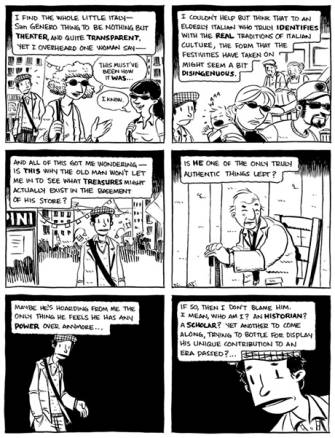 SPURGEON: What are your ambitions for your own comics?
SPURGEON: What are your ambitions for your own comics?
BURFORD: Pretty modest. I don't think I'm a very talented cartoonist. I have a pretty good grasp on what I want to do, and I experience some level of frustration in not always being able to accomplish what I have in mind because of my limitations or whatever. I just want to make a small contribution. With
Syncopated, if I can sprinkle in a story here or there, that's all I need. That makes me happy.
SPURGEON: What is the specific appeal for you in making comics?
BURFORD: I think it's the same for most people. Having worked really hard on something, getting it into the hands of others and having those who do have their hands on it reacting in a positive way. Their saying, "I really liked that." Or "You have an interesting way of drawing." Or "You have some really interesting sensibilities when it comes to writing." That kind of feedback, that kind of reward, you could pay me half a million dollars, and I'd take the other over the money any day. [laughs]
My whole life I've been living and breathing comics. Since I could literally read, since I could pick up a pencil, it's been comics comics comics for me. Just to be involved in the industry to the capacity I am with King Features is an amazing reward for me. To be able to draw some comics and get some feedback is an amazing amount of reward for me. To save my money and deal with a printer and get a book printed up is an amazing amount of reward for me. These are very different things: the cartoonist, the publisher, the editor -- all these aspects of the comics payoff that I really do feed off of.
SPURGEON: This might be too ludicrously broad for you to answer, but think ahead a year: how will the office of cartoon editor at King Features be different than it was a year ago?
BURFORD: In a general sense, we're two different people, Jay and I, as much as we had these amazingly parallel lives in what we did with ourselves and how we go about our lives and the accomplishments we've had, etc. We had different sensibilities. We're two different men. We disagreed a lot. Always very constructively, never angry at each other, but I'd walk into his office and say, "Yeah, this has got to go. This doesn't look good to me. I think it's shit." He'd say, "I don't know... I think it's pretty great. I think we should go with it." I'd be like, "Well, my opinion is that if we go with it, we'll look like idiots." He said, "You know what? I'm the boss and that's what we're doing." And I'd say, "Well, I just want you to know I disagree with you wholeheartedly, but I respect that you're the boss." That was the typical Jay and Brendan disagreement. I'm at a very different point in my life. I'm 28 years old. He was 50.
SPURGEON: [laughs] Holy crap...
BURFORD: I'll be 29 this year! It's all just a number.
Because we had our differences, I think you'll see how our sensibilities are different, and that will be recognized by people near to the situation. As far as what King Features puts out there, I mean, the parameters are tight, right? If I find a genius cartoonist, that genius cartoonist is going to speak more for themselves than the fact that I found them and gave them a developmental contract. I would just have been fortunate to be there at the right time. I think Jay would have said the same thing.
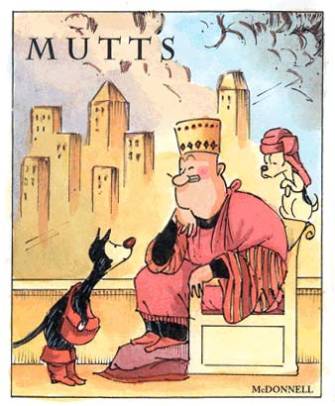 SPURGEON: Something I enjoyed about Jay is that it appealed to him on one level to facilitate a Patrick McDonnell, but there was also getting, say, a new artist on a soap opera strip and that appealed to him, too.
SPURGEON: Something I enjoyed about Jay is that it appealed to him on one level to facilitate a Patrick McDonnell, but there was also getting, say, a new artist on a soap opera strip and that appealed to him, too.
BURFORD: I like that, too. It's like we were talking about before that comics is a wide spectrum. You'll talk differently to a guy that's a fill-in artist on a soap opera strip than someone like Patrick McDonnell, but you'll get equal satisfaction out of helping both work. Jay and I had that in common. It's not all that important to me to walk around with the WWJD wristband -- What Would Jay Do? I'm my own man. I'm going to be my own man and run this the way I think it should be run. That said, so much of what I know and how I've developed comes from being mentored by Jay. He was perfectly generous in giving me his knowledge.


